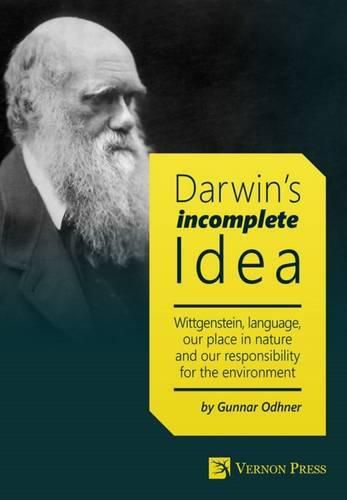Readings Newsletter
Become a Readings Member to make your shopping experience even easier.
Sign in or sign up for free!
You’re not far away from qualifying for FREE standard shipping within Australia
You’ve qualified for FREE standard shipping within Australia
The cart is loading…






This title is printed to order. This book may have been self-published. If so, we cannot guarantee the quality of the content. In the main most books will have gone through the editing process however some may not. We therefore suggest that you be aware of this before ordering this book. If in doubt check either the author or publisher’s details as we are unable to accept any returns unless they are faulty. Please contact us if you have any questions.
Why is progress in environmental protection slow and faltering? Is it because we misunderstand our place in nature? This book argues that it is the normative implications of Darwinism and their powerful grip on collective social consciousness that are partly responsible for the tardiness. For all its positive explanatory power and undoubted veracity, the normative implications of Darwinist thinking for our environmental predicament are stark: If we are children of Mother Nature equipped by her with a human nature, the responsibility for the deterioration of nature is partly Hers. This book takes a different standpoint. We are indeed children of Nature, but not primarily of the green nature or animal world but of the nature of language. We can understand how through the philosophy of Ludwig Wittgenstein, who states that Language is a graft on instinctive behavior. In our instinctive use of words we are parts of nature in a way resembling mice, frogs and giraffes. We are not as free as we think when we talk about our free will , because language uses us when we use it, hence our double roles as victims and instigators. The main thesis of this book is that rather than merely possessing language, we are language. If accepted, this realization may point the way to a more optimistic future for environmental protection and lay the foundations for a new analytical perspective on modern social behavior. Darwin’s Incomplete Idea was much discussed when first published in Sweden (Bokfoerlaget Anomali, 2013). The English edition exposes, for the first time, this important work to an international audience. It should be of interest to philosophers of language and social scientists concerned about the environment and our place in it.
$9.00 standard shipping within Australia
FREE standard shipping within Australia for orders over $100.00
Express & International shipping calculated at checkout
This title is printed to order. This book may have been self-published. If so, we cannot guarantee the quality of the content. In the main most books will have gone through the editing process however some may not. We therefore suggest that you be aware of this before ordering this book. If in doubt check either the author or publisher’s details as we are unable to accept any returns unless they are faulty. Please contact us if you have any questions.
Why is progress in environmental protection slow and faltering? Is it because we misunderstand our place in nature? This book argues that it is the normative implications of Darwinism and their powerful grip on collective social consciousness that are partly responsible for the tardiness. For all its positive explanatory power and undoubted veracity, the normative implications of Darwinist thinking for our environmental predicament are stark: If we are children of Mother Nature equipped by her with a human nature, the responsibility for the deterioration of nature is partly Hers. This book takes a different standpoint. We are indeed children of Nature, but not primarily of the green nature or animal world but of the nature of language. We can understand how through the philosophy of Ludwig Wittgenstein, who states that Language is a graft on instinctive behavior. In our instinctive use of words we are parts of nature in a way resembling mice, frogs and giraffes. We are not as free as we think when we talk about our free will , because language uses us when we use it, hence our double roles as victims and instigators. The main thesis of this book is that rather than merely possessing language, we are language. If accepted, this realization may point the way to a more optimistic future for environmental protection and lay the foundations for a new analytical perspective on modern social behavior. Darwin’s Incomplete Idea was much discussed when first published in Sweden (Bokfoerlaget Anomali, 2013). The English edition exposes, for the first time, this important work to an international audience. It should be of interest to philosophers of language and social scientists concerned about the environment and our place in it.